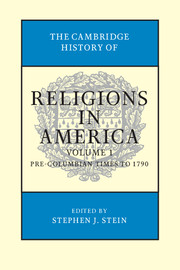Book contents
- Frontmatter
- Contents
- Contributors
- Editor's Introduction
- SECTION I BACKGROUND ON RELIGIOUS TRADITIONS – PRE-1500S
- SECTION II RELIGIONS IN THE POST-COLUMBIAN NEW WORLD – 1500–1680S
- SECTION III RELIGIOUS PATTERNS IN COLONIAL AMERICA – 1680S–1730S
- 12 Spanish Catholicism in the Caribbean, New Spain, and the Northern Frontiers
- 13 French Catholicism in New France
- 14 Congregationalist Hegemony in New England, from the 1680s to the 1730s
- 15 The Middle Colonies, 1680–1730
- 16 Religion in the Southern English Colonies, 1680s–1730s
- SECTION IV RELIGIOUS DIVERSITY IN BRITISH AMERICA – 1730S–1790
- SECTION V AMERICAN RELIGIONS IN THE EIGHTEENTH-CENTURY INTERNATIONAL CONTEXT
- SECTION VI THEMATIC ESSAYS
- Index
- References
12 - Spanish Catholicism in the Caribbean, New Spain, and the Northern Frontiers
from SECTION III - RELIGIOUS PATTERNS IN COLONIAL AMERICA – 1680S–1730S
Published online by Cambridge University Press: 28 July 2012
- Frontmatter
- Contents
- Contributors
- Editor's Introduction
- SECTION I BACKGROUND ON RELIGIOUS TRADITIONS – PRE-1500S
- SECTION II RELIGIONS IN THE POST-COLUMBIAN NEW WORLD – 1500–1680S
- SECTION III RELIGIOUS PATTERNS IN COLONIAL AMERICA – 1680S–1730S
- 12 Spanish Catholicism in the Caribbean, New Spain, and the Northern Frontiers
- 13 French Catholicism in New France
- 14 Congregationalist Hegemony in New England, from the 1680s to the 1730s
- 15 The Middle Colonies, 1680–1730
- 16 Religion in the Southern English Colonies, 1680s–1730s
- SECTION IV RELIGIOUS DIVERSITY IN BRITISH AMERICA – 1730S–1790
- SECTION V AMERICAN RELIGIONS IN THE EIGHTEENTH-CENTURY INTERNATIONAL CONTEXT
- SECTION VI THEMATIC ESSAYS
- Index
- References
Summary
The story of Spanish Catholicism in the Caribbean and New Spain from the 1680s to the end of the colonial period falls easily into two clearly distinguishable parts. The first runs to 1713 and is characterized by the perfection and consolidation of the Habsburg system of church-state relations. The second begins with a change of dynasty, the Bourbons replacing the Habsburgs, and the introduction of a far different form of government. Strongly influenced by the ideals of the Enlightenment, the new rulers completed the state's domination of the Church and centralized their rule as a form of “Enlightened Despotism.”
The Catholicism in the Spanish Caribbean in the latter half of the colonial period has not been intensively studied. It thus becomes difficult to describe it in the various islands that made up Spanish possessions in that area. The disasters of the early period of discovery and colonization, especially European diseases and exploitation, had left the Caribbean area all but depopulated of native races. As time went on, they were replaced by African slaves who were imported to work on the sugar plantations. These Africans tended to retain many of their ancestral religious beliefs and practices. Because the islands were main ports of entry and exit for Spanish treasure fleets, they became the objects of attacks by pirates.
In general the area was characterized by great poverty, small populations, and lack of good priests. The latter had little incentive to migrate to the islands, where opportunities for advancement were few.
- Type
- Chapter
- Information
- The Cambridge History of Religions in America , pp. 239 - 262Publisher: Cambridge University PressPrint publication year: 2000

